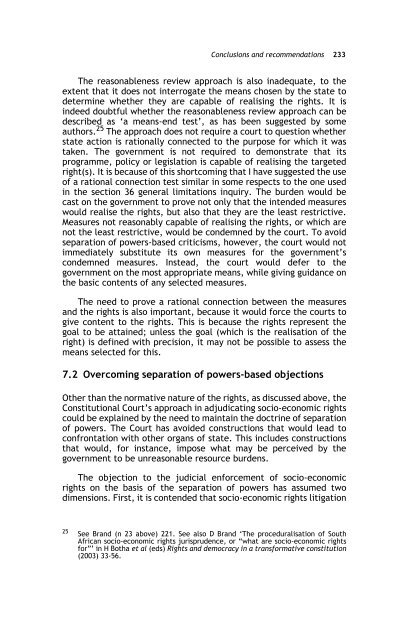LITIGATING SOCIO-ECONOMIC RIGHTS IN SOUTH AFRICA - PULP
LITIGATING SOCIO-ECONOMIC RIGHTS IN SOUTH AFRICA - PULP
LITIGATING SOCIO-ECONOMIC RIGHTS IN SOUTH AFRICA - PULP
Create successful ePaper yourself
Turn your PDF publications into a flip-book with our unique Google optimized e-Paper software.
Conclusions and recommendations 233<br />
The reasonableness review approach is also inadequate, to the<br />
extent that it does not interrogate the means chosen by the state to<br />
determine whether they are capable of realising the rights. It is<br />
indeed doubtful whether the reasonableness review approach can be<br />
described as ‘a means-end test’, as has been suggested by some<br />
authors. 25 The approach does not require a court to question whether<br />
state action is rationally connected to the purpose for which it was<br />
taken. The government is not required to demonstrate that its<br />
programme, policy or legislation is capable of realising the targeted<br />
right(s). It is because of this shortcoming that I have suggested the use<br />
of a rational connection test similar in some respects to the one used<br />
in the section 36 general limitations inquiry. The burden would be<br />
cast on the government to prove not only that the intended measures<br />
would realise the rights, but also that they are the least restrictive.<br />
Measures not reasonably capable of realising the rights, or which are<br />
not the least restrictive, would be condemned by the court. To avoid<br />
separation of powers-based criticisms, however, the court would not<br />
immediately substitute its own measures for the government’s<br />
condemned measures. Instead, the court would defer to the<br />
government on the most appropriate means, while giving guidance on<br />
the basic contents of any selected measures.<br />
The need to prove a rational connection between the measures<br />
and the rights is also important, because it would force the courts to<br />
give content to the rights. This is because the rights represent the<br />
goal to be attained; unless the goal (which is the realisation of the<br />
right) is defined with precision, it may not be possible to assess the<br />
means selected for this.<br />
7.2 Overcoming separation of powers-based objections<br />
Other than the normative nature of the rights, as discussed above, the<br />
Constitutional Court’s approach in adjudicating socio-economic rights<br />
could be explained by the need to maintain the doctrine of separation<br />
of powers. The Court has avoided constructions that would lead to<br />
confrontation with other organs of state. This includes constructions<br />
that would, for instance, impose what may be perceived by the<br />
government to be unreasonable resource burdens.<br />
The objection to the judicial enforcement of socio-economic<br />
rights on the basis of the separation of powers has assumed two<br />
dimensions. First, it is contended that socio-economic rights litigation<br />
25 See Brand (n 23 above) 221. See also D Brand ‘The proceduralisation of South<br />
African socio-economic rights jurisprudence, or “what are socio-economic rights<br />
for”’ in H Botha et al (eds) Rights and democracy in a transformative constitution<br />
(2003) 33-56.
















